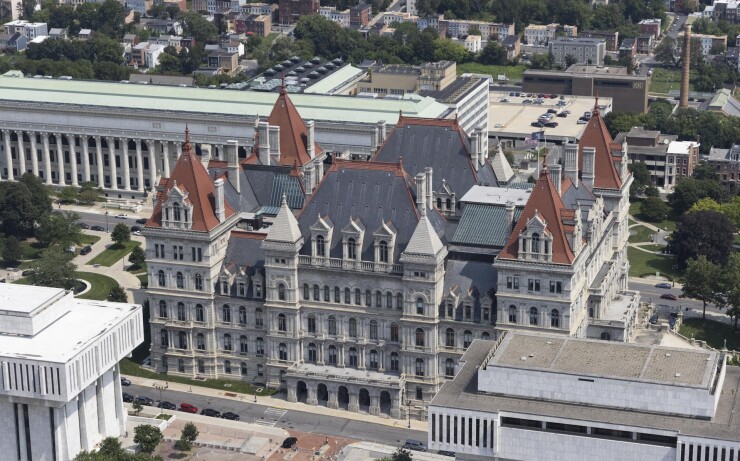The Empire State Development Corp. is set to sell $335.7 million of state sales tax revenue bonds on Thursday.
The competitive deal is the only sizable offering from a New York state issuer on this week’s calendar, a contrast to the billion-dollar deals the state’s issuers have sold in recent months.
It was a week that saw a much
Bloomberg News
The bonds have maturity dates from 2026 through 2054, with an optional redemption on September 15, 2034. Public Resource Advisory Group is the municipal advisor for the deal, with Harris Beach and Hardwick Law Firm as co-counsels.
The bonds are rated AA-plus by Fitch Ratings and S&P Global Ratings.
The Empire State Development Corp., which funds New York’s economic development corporations, typically issues bonds around once a year, backed by either sales tax or income tax revenue.
This is the ESDC’s first deal of 2024, but it’s a drop in the bucket for New York debt available to investors this year.
Last week, for instance, investors had the chance to buy $1.8 billion of bonds from the New York City Transitional Finance Authority, according to CreditSights’ Head of Municipal Strategy, Patrick Luby.
Next week’s calendar alone may feature a $1 billion deal from the Port Authority of New York and New Jersey, $900 million of bonds from the New York City Municipal Water Finance Authority, $700 from the New York City Metropolitan Transportation Authority, $350 million from the New York State Power Authority, $140 million from the Dormitory Authority of the State of New York on behalf of New York University, and $110 million from Erie County, New York.
There may be less investor money to invest in New York’s credits than in previous issuances. Redemptions from New York issuers are lower in September than any other month this year, according to Luby.
The deal will also have to contend with a slowing economy, which the state acknowledges, according to John Hallacy, president of John Hallacy Consulting. The projections on debt service coverage in the offering statement trends down from eight times coverage of maximum annual debt service this year to six times by fiscal year 2028.
The Fed’s interest rate cuts may provide a slight tailwind for the deal among retail investors, Hallacy said.
“Maybe New Yorkers feel a little wealthier after the Fed cuts,” Hallacy said. “When people feel wealthier, they spend more.”
One factor will help these bonds stand out from other New York issuances: This is the first deal backed by New York state sales tax revenue since July.
The July deal was issued by the
New York’s sales tax revenue is as strong of a credit as the Empire State itself, according to Fitch.
“Pledged receipts provide robust coverage of debt service, despite economic sensitivity,” Fitch’s analysts wrote. “The 2x ABT for sales tax revenue bonds prevents overleveraging of pledged receipts and provides a very strong cushion to absorb potential volatility, reflecting a ‘aaa’ level of structural resilience.”
There is one other point of optimism for the ESDC: as of last week, investors were not yet tired of New York’s debt.
The $1.5 billion tax-exempt component of the TFA’s deal last week was 2.9 times oversubscribed, according to a press release from the TFA.
“Due to investor demand for the tax-exempt bonds, yields were reduced relative to the start of the institutional order period by 1 basis point in 2038; by 2 basis points in 2029 and 2039; by 3 basis points in 2030, 2043, 2044 and 2049; by 4 basis points in 2040 and 2042; by 5 basis points in 2031 and 2050; by 6 basis points in 2032; and by 7 basis points in 2041 and 2051,” the press release said.
The taxable tranche of the deal was sold competitively, and received eight bidders, the press release said. The winning bid came from RBC Capital Markets with a true interest cost of 4.435%.
